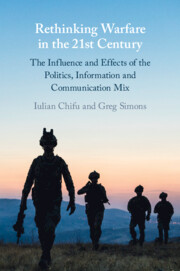‘Waging of war in the 21st century has become a highly politicised warfare, which means it is the main instrument for achieving political objectives. If it is fabricated, manipulated and justified for hearts and minds, that is facilitated by the new technological advances of our era and launched against global publics before the war takes place in regions away from the western hemisphere. This book illustrates the resulting cognitive dissonance induced by the mixture of politics and communication, such as the façade of humanitarian intervention and pre-emptive warfare in the post-cold war era that resulted in intertwined wars throughout the world, so we are really facing a different generation of warfare. As a result, this timely publication is very welcome and appreciated. Rethinking Warfare in the 21st Century unlocks the complexity of contemporary warfare through engaging with it on the levels of both theory and practice in the midst of an ongoing geopolitical power transition in international relations and global politics.’
Davoud Gharayagh-Zandi - Department of Political Science, Faculty of Economics and Political Science, Shahid Beheshti University, Tehran-Iran
‘The late modern age has strengthened the role of information and communication in all areas of human interaction. The authors focus on the change, offering a comprehensive and convincing analysis of how the change affects the character, geographic scope and intensity of contemporary warfare.’
Andrei Tsygankov - Department of International Relations, San Francisco State University
‘Iulian Chifu and Greg Simons have put together a critical review of the current state of politics, information and knowledge within the context of contemporary warfare. This is done simultaneously from complementary theoretical and empirical points of view, posing searching research questions in the introduction and answering them in the conclusion, bringing together a vast amount of information that then transforms into clear and coherent lessons. The conclusions are as revealing and illustrative as they are concerning.’
Valentin Yakushik - Professor of Political Science, Chairman of the Supervisory Board of the Ukrainian Institute of Politics and Executive-in-Residence Fellow, Geneva Centre for Security Policy
‘This book is a must-read for scholars, policy-makers, and media professionals who are deeply engaged with the evolving nature of global conflict, as it addresses fundamental questions about the transformation of warfare, the impact of political and informational dynamics, and future trends. By providing insights into these critical aspects, it serves as a valuable resource for anyone seeking to grasp the complexities of modern warfare and its broader implications on global geopolitics.’
Nadiya Kostyuk
Source: Political Science Quarterly
‘This book makes a solid contribution to understanding the connections between politics, information and media surrounding conflict. … Scholars interested in information operations, international security and technology will find this a welcome addition to the literature.’
Ryan Shaffer
Source: Media, War & Conflict



